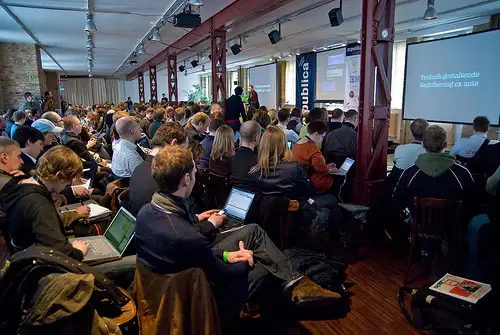Impressions from Re-publica and Social Innovation Camp
The German vs. the British websphere
Well, a week after attending both, the Social Innovation Camp (sicamp08) and re-publica, I finally post my reflections on these events. It was great to visit these two events, listen to numerous interesting presentations at re-publica, and grasp the contagious spirit of social innovation in London. There were interesting differences and similarities on discussions in these two events, but I will just extend on some thoughts I had:
- There are great projects regarding Edemocracy in both countries, which allow citizens to participate or influence politics and to give more transparency. There is even a German-British cooperation called e-participation.net. On a workshop, full of interesting presentations about this topic, Christoph Dowe said that it is still not easy to get citizens to engage on those platforms. Some websites do not get any attention and others, such as ich-gehe-nicht-hin.de ( "I do not go there") for nonvoters or abgeordnetenwatch.de (ask the member of Parliament), are successful. Mysociety.org has great projects in this regards, based in the U.K. For example, Fix my Street.
- On both events free and open source software (FOSS) played an important role. It is clear that FOSS invites for collaboration and allows to build platforms for social innovation, which proprietary software cannot do because it is for commercial purposes. Regarding knowledge sharing, I really like the presentation of deepmehta software, in which knowledge is represented in a semantic network and is handled collaboratively.
- The whole topic around social change, innovation or entrepreneurs plays are far more a significant role in the U.K. Whereas on the re-publica, social entrepreneurs, e.g. startups for social change, played no role although there were promising projects such as betterplace.org and helpedia.org (will blog soon about them). The social innovation camp was fully devoted to this topic.
- Whereas at re-publica privacy laws and data protection were high on the agenda, on the social innovation camp they were of no importance. In contrary, I was surprised how openly people took user generated content for granted. The all over camera surveillance (CCT) in London is rather not amusing.
Local vs. global news
 Another interesting development, is the emphasis on the local, as a sicamp08-fellow pointed it out to me during the first evening. The internet is truly global and it is great to connect with people worldwide, but there is this paradox that in the UK or in Germany one often does not even know its home-neighbours. So, there are projects coming up to have social network applications, so that people from an area can find similar interests and engage in community development.
Another interesting development, is the emphasis on the local, as a sicamp08-fellow pointed it out to me during the first evening. The internet is truly global and it is great to connect with people worldwide, but there is this paradox that in the UK or in Germany one often does not even know its home-neighbours. So, there are projects coming up to have social network applications, so that people from an area can find similar interests and engage in community development.
At the re-publica.de, I listened to a presentation by Sean Bonner about "Blogging about local issues, on a global scale." It dealt with the high relevance of local news in the global web and how metblogs.com tries to cover that. Sean Bonner said:
Before the web local issues did not get as much attention - national and international stuff was more important. Money was made through those kind of news. The Internet changed the distributing and exchange of news specifically on the local level. Blogs play a decisive role. Blog networks are key in local news exchanging.
Back in 2003, Sean Bonner and friends found that there was a lack of local information. Opinions, thoughts and recommendations about local issues. They started working on a local blogging network in L.A, and then opened up a platform called metblogs.com for a overarching network of local bloggers. Nowadays, over 50 cities are participating.
One interesting example is the coup back in 2006 in Bangkok, Thailand. First news appeared 6 hours before CNN on metblogs.com by people equipped with mobile phones. Similarly happened in Pakistan during the web blackout last year. There was also an interesting attempt by AOL to copy their concept, but it did not work out without a community. Sean Bonner said the newspapers rather copy the tools, but forget about the social dimension behind local community blogging.
I did not know about this network before, but it looks interesting. However, it seems often quite individualistic and with random topics. Global Voices Online follows closer developments in countries and translates them in other languages.
An in depth Social Innovation Camp blog post is in process. :-)